Wi-Fi 6E Routers: 2022’s Cutting Edge List
Since early 2021, Wi-Fi 6E routers and mesh systems have grown like (expensive) mushrooms after rain. There will be more as time goes by. The all-new 6GHz frequency band has its allure.
But there are still not enough. Eventually, this post will consist of the best Wi-Fi 6E routers and Wi-Fi systems, but for right now, you’ll find all of them here, except the eero Pro 6E that I decided not to test.
With Wi-Fi 7 on the far horizon, these Wi-Fi 6E options, for now, are the best you can get on the local wireless connection front. And they will be relevant for years to come.
If you want to bask your home in the clean 6GHz signals, you’re at the right spot to figure out that right purchase.
Dong’s note: I first published this post on May 17, 2021, and last updated it on June 26, 2022.
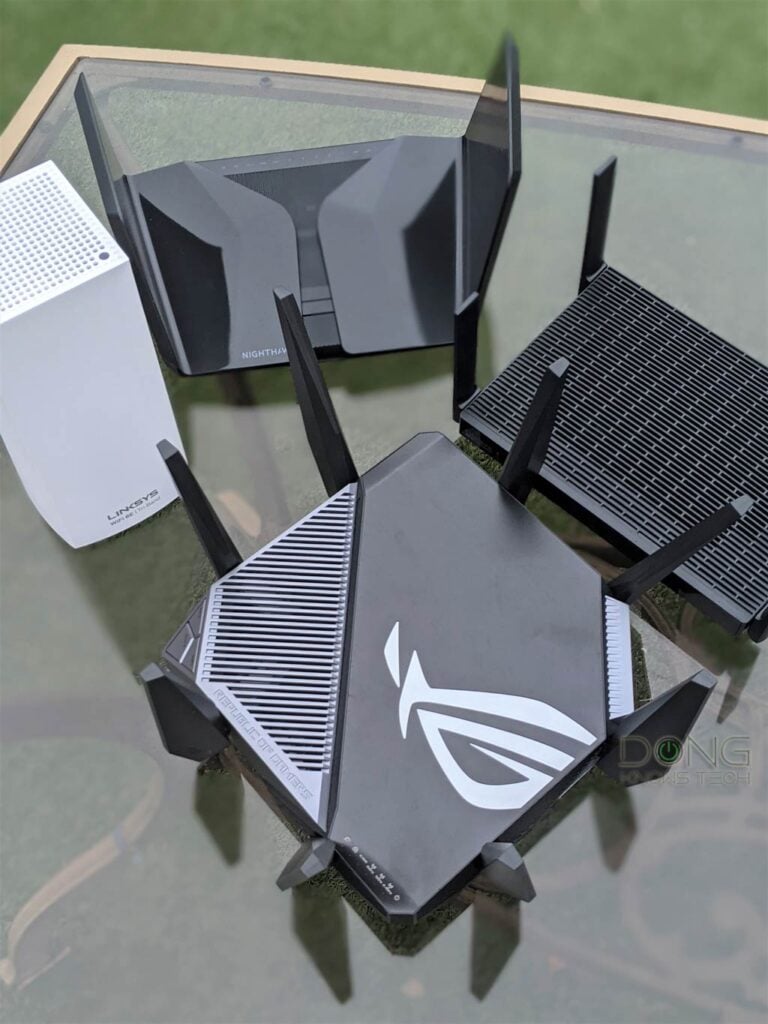
Wi-Fi 6E routers and mesh systems in 2022: The list
This list includes standalone routers and mesh systems and is sorted in the review order. The numbers are just numerical and not meant to be the ranking.
I’ll update it as I review more — so bookmark it. Scroll down to the bottom of the page for their performance numbers.
9. Asus ROG Rapture GT-AXE16000: The ultimate Wi-Fi router (until Wi-Fi 7)
(If you didn’t read the intro, this is the latest member on this list — the number is only numerical, not the ranking.)

The Asus GT-AXE16000 is the 2nd Quad-band Wi-Fi broadcaster, besides the Netgear Orbi RBRE960 (below). It has everyone any user would want — as a standalone router or an AiMesh member.
It’s a safe buy as long as you can afford it. And that’s a big if.
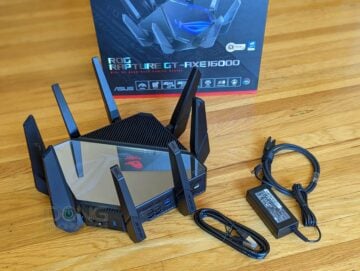
Pros
Powerful hardware, Quad-band with Wi-Fi 6E support, three Multi-Gig ports (one 2.5Gbps and two 10Gbps)
Stellar performance throughout
Excellent set of game-related, online protection and monitoring features, full AiMesh 2.0 support
Unmatched port flexibility, including interchangeable WAN, Dual-WAN, and LAN/WAN Link Aggregations
Beautiful ROG Aura lighting
Cons
Expensive, NAS performance (when hosting a storage device) could be better
Awkward backhaul band design in a wireless AiMesh setup, no UNII4 (5.9GHz) support, no SFP+
Bulky design, not wall-mountable
8. TP-Link Deco XE75: The most adorable Wi-Fi 6E mesh to date
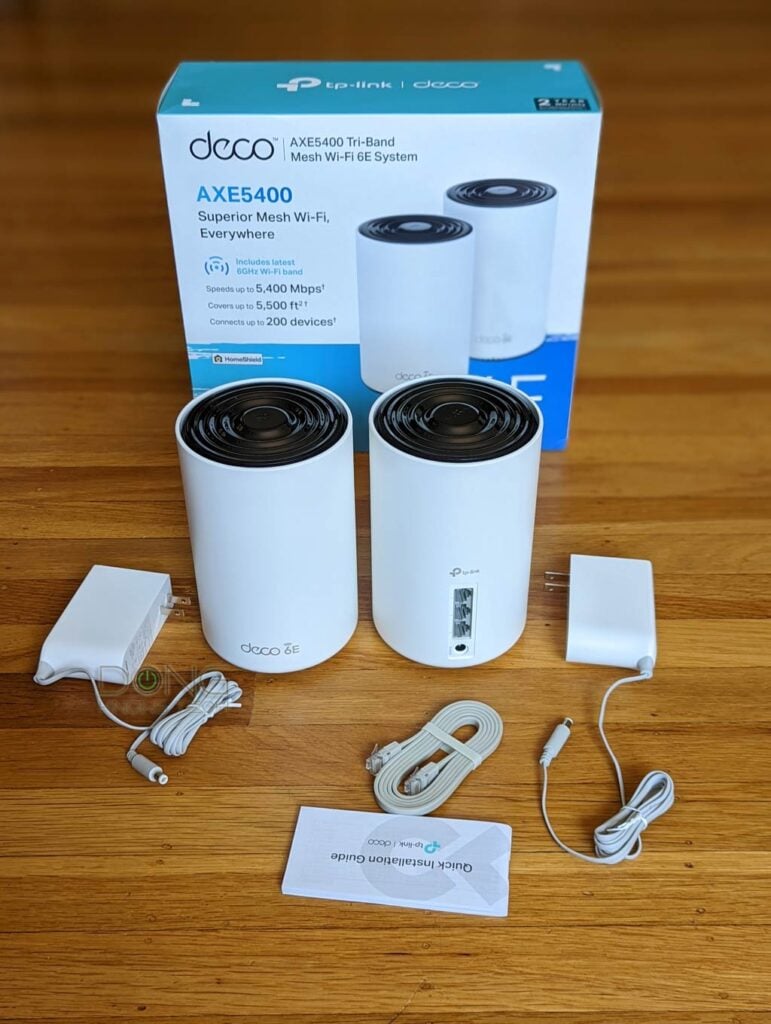
The 2-pack Deco XE75 — also available as the 3-pack XE5300 variant — is the first Wi-Fi 6E solution from TP-Link.
Featuring 2×2 Wi-Fi specs and having no Multi-Gig port, the new mesh is disappointing. That’s until you learn about this cost.
At just $300 for a 2-pack, it’s the most affordable among Wi-Fi 6E hardware. And for that price point, it’ll make an excellent buy for sub-Gigabit networking needs — especially when used with a wired backhaul.

Pros
Wi-Fi 6E-ready with reliable and extensive coverage
Cons
No Multi-Gig port, Link Aggregation, or Dual-WAN
TP-Link login account and mobile app required
No real, local web-based management
Only three network ports on each unit
7. Asus ZenWiFi Pro ET12: First Multi-Gig wired mesh set out of the box
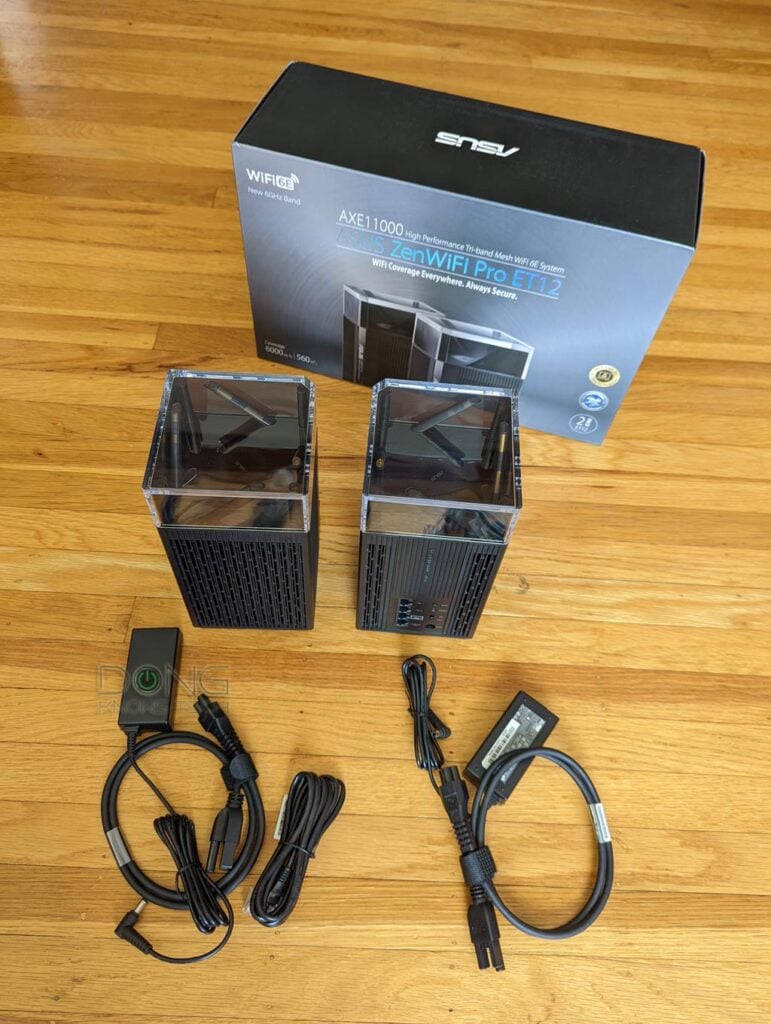
The ZenWiFi Pro ET12 is the second Wi-Fi 6E mesh system from Asus.
Like the ET8 that came out almost half a year ago, this new mesh doesn’t have an additional band to work as backhaul.
As a result, it works best in a wired backhaul setup. And in this case, thanks to the top-tier Wi-Fi specs and the two Multi-Gig ports, it might be one of the best mesh Wi-Fi systems with Multi-Gig wired backhaul you can get.
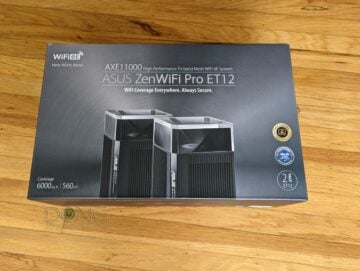
Pros
Wi-Fi 6E-ready, extensive Wi-Fi coverage with top performance in specific setups with possible fast Wi-Fi performance in certain setups
Dual Multi-Gig pots with Multi-Gig wired backhaul, flexible port configurations
Excellent performance and coverage as a standalone router
Tons of useful features and settings, flexible Wi-Fi customization
AiMesh 2.0 full support, helpful mobile app, no login account required
Cons
Bulky, no USB, only four network ports
Fluctuating performance as a fully wireless mesh due to the lack of a dedicated backhaul band
Expensive, not wall-mountable
6. Netgear Orbi RBKE960 Series: The symbol of success (very expensive, that is)

Available as a 3-pack — RBKE963 (white) or RBKE963B (black) — the new Orbi Wi-Fi 6E system is insanely expensive costing $1500 — and you have the option to pay even more over add-on subscriptions.
On top of that, it has fewer included features and settings compared with previous Orbi sets.
In return, you’ll get substantial and powerful hardware. The most exciting part is it can do Multi-Gig wired backhaul, though you’d need a switch if you want to use both satellite units that way.
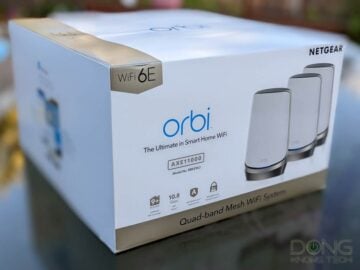
Pros
Powerful hardware with Quad-band Wi-Fi and Multi-Gig wired backhaul support
Excellent Wi-Fi coverage, fast performance
More Wi-Fi networks than previous Orbis, including two additional virtual SSIDs
Cons
No web-based Remote Management, few free features, Mobile app (with a login account and even subscriptions) are required to be useful
Rigid Multi-Gig ports’ roles, few Multi-Gig ports
The 2nd 5GHz band is unavailable to clients even with wired backhauls, no 160MHz channel width on 5GHz
Limited Wi-Fi customization, bulky design
5. Asus ZenWiFi ET8: Excellent for a wired home

The ZenWiFi ET8 is basically Asus’s Wi-Fi 6E alternative to the ZenWiFi XT8, a same-design purpose-built Wi-Fi 6 mesh system for a fully wireless setup.
In that sense, the ET8 is not an upgrade to the older cousin — it’s terrible in a wireless configuration. Instead, it’s an option for a home that’s either already wired or has a lot of open space.
The ZenWiFi ET8, for now, is available as a 2-pack, but you can use each hardware unit as a standalone router for a small home. And it works very well in that case.

Pros
Reliable and extensive coverage with possible fast Wi-Fi performance in certain setups
Wi-Fi 6E ready, Multi-Gig WAN, and Dual-WAN support
Excellent as a standalone router
Tons of useful features and settings, flexible Wi-Fi customization
Cons
Comparatively slow performance in most use cases
No Link Aggregation or Multi-Gig LAN port
Only four network ports on each hardware unit
4. Linksys AXE8400 Atlas Max 6E: First Wi-Fi 6E mesh system
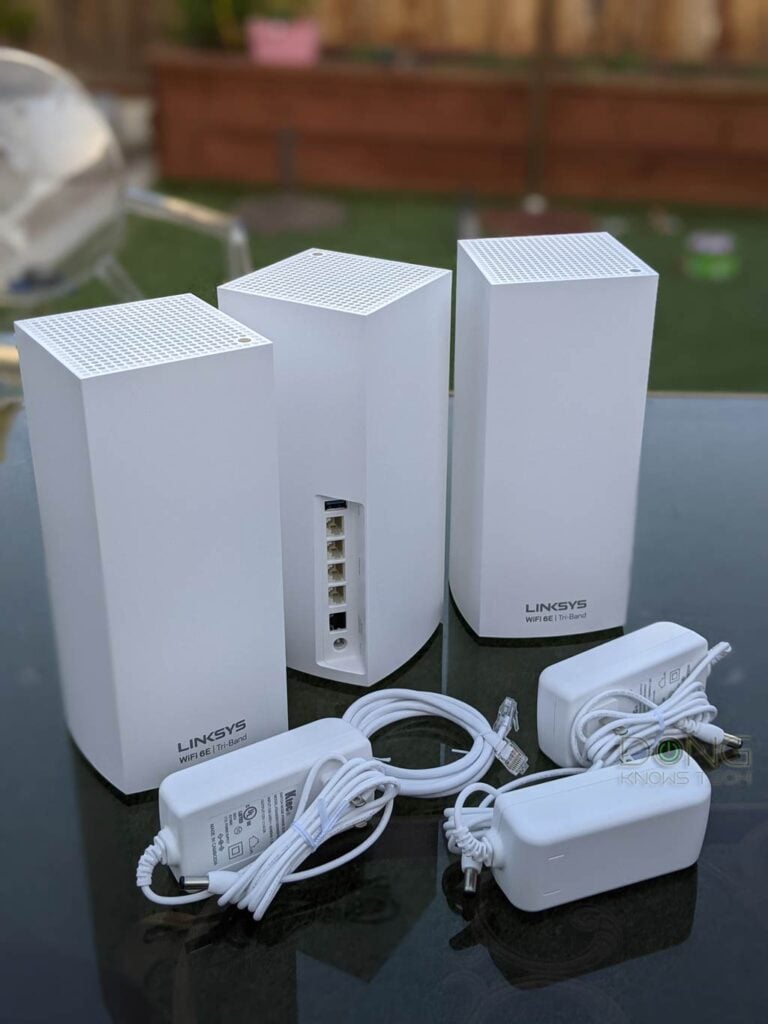
Linksys seemed determined to lead the charge in Wi-Fi 6E. Apart from the MR7500 below, this AXE8400 Atlas Max 6E is the company’s 2nd 6E broadcaster and the first mesh system of the new Wi-Fi standard.
The new mesh consists of three identical tri-band 6E broadcasters, model MX8500. Each can work as a standalone router, but you can combine them into a system to deliver coverage of all three bands (2.4GHz, 5GHz, and 6GHz) in a large property.
That’s if you think you have enough reasons right now to invest $1200 in it. Hint: It’s not worth it. Make sure you have wired your home and wait until the price drops.
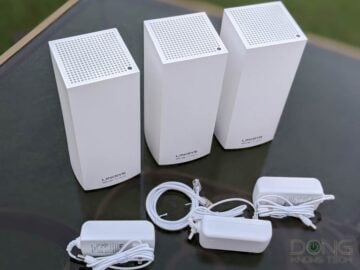
Pros
Reliable performance, extensive coverage
Excellent NAS performance when hosting external storage device(s)
Separate SSID for each band
Cons
Comparatively slow mesWi-FiFi speeds in homes with walls
Limited Wi-Fi settings and features, mobile app coercion
No Multi-Gig LAN port (main router), Dual-WAN, or Link Aggregation
No setting backup and restore
3. Linksys MR7500: A nice third though not necessarily the charm

The Linksys MR7500 is the third Wi-Fi 6E router on the market, and the third time is not necessarily the charm in this case.
The new router looks a bit subdued in design — it’s sort of mundane looking. Its hardware specs are also relatively modest compared with the first two.
It’s a router that bets a bit too big on Wi-Fi 6E, making it less useful for the mainstream market.

Pros
Simple design with 5Gbps WAN port
Robust web interface, helpful (optional) mobile app
Cons
6GHz band requires Gig+ or faster Internet to be useful
Slow 5GHz and 2.4GHz bands
Limited Wi-Fi settings, mobile app coercion
No Multi-Gig LAN port, Dual-WAN or Link Aggregation
Buggy and slow NAS performance when hosting a storage device
2. Netgear RAXE500: A formidable contender

The Netgear RAXE500 is the second Wi-Fi 6E router on the market, and it’s the natural rival of the GT-AXE1000 below.
But within Netgear’s ecosystem, this one is quite familiar — it’s the 6E version of the tri-band RAX200. Among other things, you’ll love the design. As such, it’s one of the most awesome-looking Wi-Fi broadcasters on the market. That’s if you can stomach the $600 price tag.

Pros
Collectively excellent Wi-Fi speeds and range
2.5Gbps LAN/WAN port, Dual-WAN, and LAN/WAN Link Aggregations
Robust web interface, helpful (optional) mobile app
Fast network-attached storage when hosting a storage device
Cons
Wi-Fi 6E is still in the early stage
No 10Gbps port, only one 2.5Gbps port
Limited Wi-Fi settings, no built-in QoS or Parental Controls
Online protection requires a subscription
Internal fan, a bit buggy (at launch)
1. Asus GT-AXE11000: The very first Wi-Fi 6E router
(In case you didn’t read the intro: This is the first member on this list — the number is only numerical, not the ranking.)

Initially announced in mid-2020, the Asus GT-AXE11000 didn’t materialize until January 2021. Yet, it still made it the very first on the market that sported the all-new Wi-Fi 6E standard.
For the most part, this new router is a variant of the GT-AX11000. The two share the same design, ports, and processing power. The GT-AXE11000, however, uses a 6GHz band in place of the 5GHz-2 band.
And that makes all the difference. Oh, it’s also the most expensive router from Asus, costing $550 apiece. That’s if you’re lucky to find one right now at that price.

Pros
Tri-band with Wi-Fi 6E support
Excellent 5GHz and 2.4GHz performance
Excellent set of game-related, online protection and monitoring features, full AiMesh 2.0 support
2.5Gbps LAN/WAN port, Dual-WAN, and LAN/WAN Link Aggregations
Cons
Wi-Fi 6E is not fully available
Only one 2.5Gbps port, no 10Gbps port
Bulky design, not wall-mountable, buggy firmware (at launch)
Wi-Fi 6E Routers and Mesh Systems in 2022: The performance
I tested Wi-Fi 6E routers the way I do all routers. For the 6GHz band testing, I use a couple of devices running the Intel AX210 Wi-Fi chip with the latest official Windows 11 driver.

Other than Wi-Fi, when applicable, I also tested their USB-related storage performance when hosting a portable drive.

The final thoughts
Considering the fast speed but short range of the new 6GHz band, Wi-Fi 6E is an exciting addition to the existing 2.4GHz and 5GHz bands — it’s not a replacement for either.
And compared to Wi-Fi 6, Wi-Fi 6E has had a slightly slower adoption rate, especially on the clients’ side. That might have had something to do with the upcoming Wi-Fi 7. However, it generally doesn’t hurt to get a Wi-Fi system that supports this standard.








